- Home
- Antonia Fraser
Cromwell Page 24
Cromwell Read online
Page 24
It was no wonder that Cromwell, referring to the battle a few weeks later, wrote: “You have heard of Naseby. It was a happy victory …” Fortunate indeed were the forces of Parliament who had wiped out the Royalist foot, all five thousand of it, by capture or death. Quite apart from the lustrous diamond rings and other kingly gems which accrued to them from Charles’s baggage, there was the Royalist artillery train, a valuable acquisition, with its powder and ammunition. Sir Henry Slingsby reveals in his Diary that Charles now bore his grief at the disaster with much constancy, showing his usual “admirable temper”, which was neither exalted in prosperity nor dejected in adversity, and all the more praiseworthy since he had no one on whom to lean for comfort.18 But as with so many of the ill-fated house of Stuart, Charles’s personal charm to those who knew him contrasted sadly with the public reputation for trickery that he acquired by his royal habits of negotiation and counternegotiation on many fronts. The most prized loot of all in his baggage was Charles’s own papers, and these, fatally for his credit, revealed how far Charles was apparently intending to go in bringing over an Irish Catholic army to England on the one hand, and making concessions to the Catholics in Ireland on the other. There was even question of the arrival of some foreign troops from the Duke of Lorraine. It mattered not to the Parliamentary leaders whether Charles actually intended to carry out his promises to the Irish, or whether he was simply bargaining with them, as he bargained with Parliament. The impression of dubiety and ill-faith was there.
* * *
King Charles’s unfortunately phrased correspondence was read aloud first in the House of Commons, then in a common hall in the City, and finally printed for all to read to general execration. The happier fate of Oliver Cromwell in the minds of the public was to be elevated to a new height of fame. Indeed, the whole victory of Naseby was considered to be a triumph for the Independents, in the internal battles of the Parliamentary parties, who were said to be newly “on a high pin” in London.19 Cromwell’s military reputation was sufficiently enhanced for there to be no further question of the termination of his employment in the following twelve months before the end of the war. Immediately after the battle the House of Commons had passed a measure to retain him in the Army “until the pleasure of both Houses”; this the Lords did manage to transform sulkily into a mere three months’ commission, with the pay of a Lieutenant-General from the expiry of the forty-day period he was then serving. But on 12 August Parliament voted to extend his service for four months longer, and on 23 January of the following year his commission was extended for a further six months’ period. For all the suspicions of the Lords, the provisions of the Self-Denying Ordinance were no longer a serious threat to Cromwell’s generalship after Naseby.
The general welfare of his own men was however a different matter. Murmuring troubles of Presbyterian versus Independent were an unpleasant feature of the post-Naseby months. Cromwell himself had already anticipated the possibility in his battle report to the Speaker of the House, which ended with this passage, in which one can detect a real note of anguish, lest an opportunity for goodwill be lost:
Honest men served you faithfully in this action. Sir, they are trusty; I beseech you in the name of God, not to discourage them. I wish this action may beget thankfulness and humility in all that are concerned in it. He that ventures his life for the liberty of his country, I wish he trust God for the liberty of his conscience, and you for the liberty he fights for.20
But the appeal was ignored. The House of Commons deliberately refrained from printing these allusions to the beliefs of the Independents in its official circulation of Cromwell’s letter.
Of course not every Independent in the Army was a calm, wise, tolerant statesman. Richard Baxter, paying a celebrated visit to Cromwell’s soldiers a few days after Naseby, was absolutely horrified by what he found. On the one hand there were many wild and woolly fancies concerning the relationship of man to Christ, all couched in the most shocking language by these “hot-headed sectaries” and none the better – in Baxter’s view – for the rough humour of some of their observations. For the soldiers, like their General, would appreciate a joke or too, even on such serious matters and thought nothing of referring to “Priest-biters” for Presbyters, “the Dry-vines” for divines, and the Di’ssembly men. On the other hand their political views on the relationship of Church and State were almost more horrifying: there was much loose talk concerning the King, who was referred to as an enemy and a tyrant, and as such even his death was discussed. Of course it was not suggested that this lunatic – or criminal – fringe represented the views of Cromwell and the military command: they merely, as Baxter said, “took on them to join themselves to no party, but to be for the liberty of all . . .”21 It was just that this liberty seemed to cover with a blanket of genial tolerance every kind of danger. Baxter decided it was his duty to serve as a chaplain attached to the Army in Whalley’s regiment, in order to guide the men into better paths.
But it was no part of Cromwell’s plan that either Baxter or any other chaplain should bring into the heart of his model army the canker of Presbyterian conformity. In general the chaplains of the New Model were not attached to any particular regiment, so that they could preach as and when they wished to groups of soldiers; they were also entitled to attend the councils of war. At the same time the men themselves were not supposed to indulge in preaching which was the prerogative of the ministers. It was, as it was intended to be, a loose arrangement, albeit of a clearly Independent slant. The men, the honest men of Naseby, had fought well. So long as they were good soldiers, so long as the fortunes of the Army prospered, let them enjoy that liberty of conscience for which after all they had wielded their arms so valiantly. As for the Presbyterians, Colonel Purefoy warned Baxter personally about his plans for spreading a strict religious regime in the Army: “If Noll Cromwell should hear any soldier speak such a word, he would cleave his crown.”
For one thing there was still much work for the Army to do in the ensuing twelve months before the end of the first Civil War, even if it lacked the notable drama of the great set-pieces such as Naseby and Marston Moor. In some ways the pattern which now emerged of siege, assault, victory, and moving on to the next siege, as one by one the Royalist strongpoints were snuffed out like so many candles being extinguished, was more characteristic of early seventeenth-century warfare than a direct confrontation. It was Cromwell who had been bold enough originally to desire to kill the snake in battle instead of scotching it in a series of sieges, which tended to be inconclusive. The King’s instinct had always been towards fortress warfare. But Cromwell now revealed himself a prudent and careful exponent of the art of siege warfare, as well as incidentally a humane soldier: in a multitude of little incidents in these prolonged operations we find Cromwell the man displaying kindness and Cromwell the General displaying generosity.
It might be giving a pass to a Mr Chichley to see his sick wife, for which Cromwell had to apologize to Parliament although in noticeably reluctant terms: “I thought it to be an act of humanity … I can say I have done you service by some civilities, nor have I taken liberty this way, I hope I never shall, but out of judgment to serve you.” Or it might be the more controversial case of John Lilburne who had been voted money by the House of Commons for his suffering at the hands of the Star Chamber, and was also owed arrears of pay for his service as a soldier, yet could obtain satisfaction on neither count. Cromwell gave him a letter of recommendation to the House, together with a warning to Parliament that those at home should be careful not to ignore the claims of those protecting them in the field: “Truly it is a grief to see men ruin themselves through their affection and faithfulness to the public and so few lay it to heart.”22 A picture is built up of a man much in command of himself, as of his men, and sufficiently confident of both to need no other savagery or harshness to pursue his aims successfully.
The King vanished west after Naseby to the Welsh borders, and it was hoped that mo
re troops would join him from the interior of Wales itself. The Scots under Leven now advanced, and the King then took refuge in Raglan Castle, the redoubtable stronghold of that keen (and Roman Catholic) Royalist, the Marquess of Worcester. But it was decided that Fairfax’s own army should be thrown into action against the continuing menace of Goring, still at the head of a substantial force in the south-west and able to threaten Taunton. Goring’s campaign to keep his army at liberty and hold off Parliament from such strongpoints as Bridgwater was not unavailing; until Fairfax and Cromwell succeeded in pushing him into action at Long Sutton near Langport on 10 July. They in their turn took a calculated risk since Goring was not only unwilling to fight, hoping to “march away at pleasure”, but was also entrenched in a strong position, and the assault involved a courageous cavalry charge in the face of Goring’s men up a narrow pass.
It is sometimes suggested that the New Model owed all its gains to superior tactics and training, and the fact that it seldom gave battle unless the circumstances were sufficiently favourable virtually to ensure a victory; but Langport showed that the New Model also had another great asset in the desperate courage and martial enthusiasm it was capable of showing in its attack. At Cromwell’s orders, Major Bethel now charged forward at the head of 120 men “with the greatest gallantry imaginable” in his General’s own words, and “brake them at sword’s point”; nor would he be gainsaid even when the enemy re-charged him with four hundred fresh horse. Then Major Desborough backed up Bethel, and Bethel, turning round from the point to which his charge had brought him, was able to assist him fairly cutting up the enemy, while the foot “coming on bravely” rapidly joined them. The result was a massacre: two thousand killed, the Royalist foot totally broken, a multitude of both men and horses captured. The powerful fortress of Bridgwater fell to Parliament soon after, adding a rich haul of ammunition and artillery to the gains. “Thus you have the Long Sutton mercy added to Naseby mercy,” wrote Cromwell, “And to see this, is it not to see the face of God!”23
Back in London, so Whitelocke noted, there was a Sunday of public thanksgiving for this success, and in the afternoon rather a different sort of celebration when crucifixes, popish pictures and books were burnt in Cheapside where once the cross had stood. In the meantime it was the duty of this western detachment to put an end to the activities of some rural exponents of the art of plunder known as the Clubmen. In part they had been profiting from the general breakdown of law and order in the countryside, in part they were protesting against those who had pilfered their own property.* ( * One of their original mottoes had in fact been: If you take our cattle We will give you battle.) Cromwell showed some understanding of their essentially primitive and non-military nature, calling them ‘poor silly creatures’, and taking considerable trouble to avoid fighting them unnecessarily. It was only after three messages of peace had to be sent in vain to a force of two thousand of these turbulent spirits ensconced on the earthworks of Hambledon Hill near Shaftesbury, that he reluctantly ordered the attack. In dealing with them afterwards he put more emphasis on future good behaviour – they might defend themselves against the efforts of others to rob them but that was all – than past crimes.24
It was against a background of these preliminary western successes for Parliament, as against the triumphs of Montrose in Scotland where he captured Glasgow for the King on 15 August, that it was decided that the siege of Bristol should be attempted. There Prince Rupert still lurked with at least two thousand men. There was also plague within the walls, but everyone felt confident that God would protect his own, and indeed not one Parliamentary soldier went down with the plague during the siege, a remarkable sign of God’s goodness to the Army, according to Joshua Sprigge. It was as well that Fairfax and Cromwell were full of confidence as to their powers of reducing Bristol, since Leven had just been besieging Hereford without success. Time had to be taken by the two commanders to write a brotherly letter of sympathy, all the more heartfelt because they recognized that his sufferings had been caused by coming to their assistance; they pledged themselves to help in return when it might prove necessary.25
On 25 August Fairfax and Cromwell together signed an engagement of safety to the citizens of Bristol for their persons and estates, should the city surrender. But it was not until 10 September that the actual storm of the town commenced, at two o’clock in the morning. It was watched by the pair of Generals from the top of Prior’s Hill Fort. It was a position which proved richer in observation value than in safety, since in the course of the battle, they were missed by only “two hands breadth” by a bullet. On one side of the city regiments of attack including Cromwell’s own were at first repulsed; but after only two hours of bombardment the other, Gloucestershire, side of the city gave way. Just as the Parliamentary commanders were watching with great anxiety the leaping flames of Bristol (apparently fired by Rupert) “fearing to see so famous a city burnt to ashes before our faces”, a trumpeter came from the Prince to desire a treaty of surrender.26 Honourable terms were granted. And although Rupert was subsequently bitterly accused by his own side for having deserted the cause unnecessarily, the fact that he was able to march away with his men more or less intact, and then to the King’s capital of Oxford, showed that there was in fact much wisdom in his behaviour.
The whole incident left Cromwell at any rate more convinced than ever that God had put a sword into the hand of Parliament “for the terror of evil-doers” and he would have to be “a very Atheist” that did not acknowledge the direct agency of God in all these matters, as great cities surrendered after the shortest possible period of strife. He also had some succinct observations to make on the subject of the soldiers’ mood: “Presbyterians, Independents, all had here the same spirit of faith and prayer; the same presence and answer; they agree here, know no names of difference; pity it is it should be otherwise anywhere!”27 But when the despatch was printed for the public, the House of Commons once again, as after Naseby, took care to omit such controversial reminders of the lack of religious unity in their midst. As for Prince Rupert, his fierce character, in contrast to the reputation of Fairfax and indeed Cromwell at the time, may be judged by the fact that it was the people of Bristol who howled as he marched out: “Give him no quarter, give him no quarter!”
Three more sieges now followed. Devizes was taken without losses as a result of the prudent surrender of the Governor on 22 September; afterwards many strangers were found within, with passes for such distant and exotic lands as Egypt, Mesopotamia and Aethiopia. Winchester fell on 28 September. The second day of the bombardment of Winchester had fallen on a Sunday. But Hugh Peter reported how religious observance and aggressive warfare could be neatly combined: “The Lord’s Day we spent in preaching and prayer, whilst our gunners were battering .. ,”28 Strict discipline was maintained among the Parliamentary soldiers afterwards according to the articles of surrender; Cromwell even had one of his own men publicly put to death for plundering as an example to the rest. There now only remained one Royalist garrison between the West and London, and that was the fabulous stronghold of Basing House, fortified by the devoutly Catholic and profoundly loyal John Paulet, 5th Marquess of Winchester.
There were many rumours current concerning Basing House, some of which concentrated on the treasure trove said to lie within its depths and others on the equally large hoard of Catholic priests which it was believed to harbour. From the beginning of the war Basing had certainly acted as a magnet for beleaguered Catholics as well as other Royalists all over the South-West. By now its inhabitants were mainly Catholics. Although recent research has pointed out that the percentage of Catholics who were active Royalists was surprisingly low, contrary to the suggestions of Puritan propaganda and probably because King Charles had not treated the community as a whole particularly well in the years before the war, there were exceptions to this rule wherever the powerful local magnate was himself a Catholic.29 Here the general attitude of neutralism did give way to something more be
lligerent. Around Raglan Castle in Monmouthshire, in Somerset, in Lancashire, and above all in 1645 at Basing House, the Catholic religion did appear to be armed with a sword.
The stronghold itself, just outside the small town of Basingstoke, was critically situated holding the main road from London to the West. It had been built in 1530 by the first Marquess, reputedly the richest man in England; a century later, in the hands of his descendant, this busy ants’- nest of fortifications was being described in a pamphlet as “the onlie rendezvous for the Cavaliers and Papists thereabouts”. Lord Winchester himself had done wonders to hold it in the past two years, being wounded in the process. He himself was a man of much taste and refinement, and within the confines of Basing had taken refuge not only the dreaded priests but also the engraver Wenceslaus Hollar and the great Inigo Jones. There was also something sublime about the devotion of the owner of Basing House to the cause of his King – this was the man who had scratched “Aimez Loyaute” on every window pane in the house with a diamond. There was something royal too about his own state: “fit to make an Emperor’s court” Cromwell’s chaplain called it afterwards to the House of Commons with unwilling admiration, so rich was Winchester’s palace in jewels, plate and works of art.30

 Warrior Queens
Warrior Queens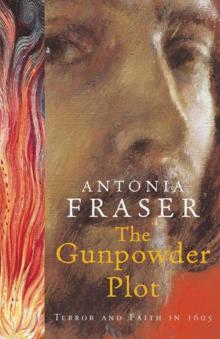 The Gunpowder Plot
The Gunpowder Plot Cromwell
Cromwell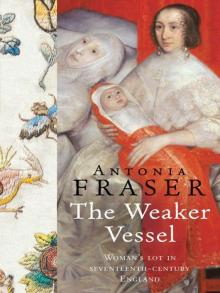 The Weaker Vessel: Women's Lot in Seventeenth-Century England
The Weaker Vessel: Women's Lot in Seventeenth-Century England Marie Antoinette: The Journey
Marie Antoinette: The Journey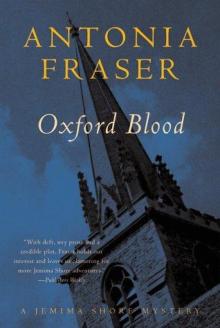 Oxford Blood
Oxford Blood Your Royal Hostage
Your Royal Hostage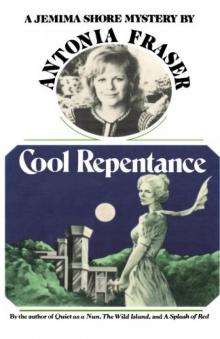 Cool Repentance
Cool Repentance Mary Queen of Scots
Mary Queen of Scots Political Death
Political Death Royal Charles: Charles II and the Restoration
Royal Charles: Charles II and the Restoration My History: A Memoir of Growing Up
My History: A Memoir of Growing Up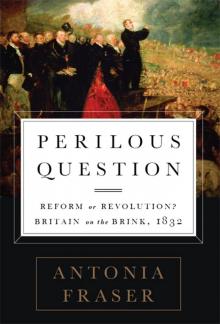 Perilous Question: Reform or Revolution? Britain on the Brink, 1832
Perilous Question: Reform or Revolution? Britain on the Brink, 1832 Jemima Shore at the Sunny Grave
Jemima Shore at the Sunny Grave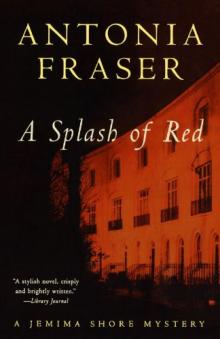 A Splash of Red
A Splash of Red Must You Go?: My Life With Harold Pinter
Must You Go?: My Life With Harold Pinter Love and Louis XIV: The Women in the Life of the Sun King
Love and Louis XIV: The Women in the Life of the Sun King The Warrior Queens
The Warrior Queens The Wild Island
The Wild Island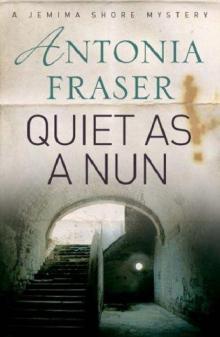 Quiet as a Nun
Quiet as a Nun Perilous Question
Perilous Question Cromwell, the Lord Protector
Cromwell, the Lord Protector Gunpowder Plots
Gunpowder Plots The Wild Island - Jemima Shore 02
The Wild Island - Jemima Shore 02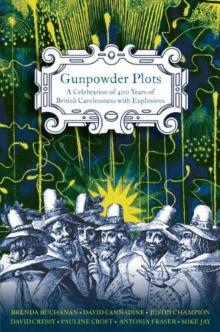 Gunpowder Plots: A Celebration of 400 Years of Bonfire Night
Gunpowder Plots: A Celebration of 400 Years of Bonfire Night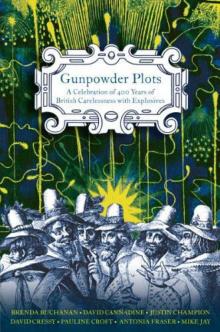 Gunpowder Plots_A Celebration of 400 Years of Bonfire Night
Gunpowder Plots_A Celebration of 400 Years of Bonfire Night Marie Antoinette
Marie Antoinette Must You Go?
Must You Go? My History
My History